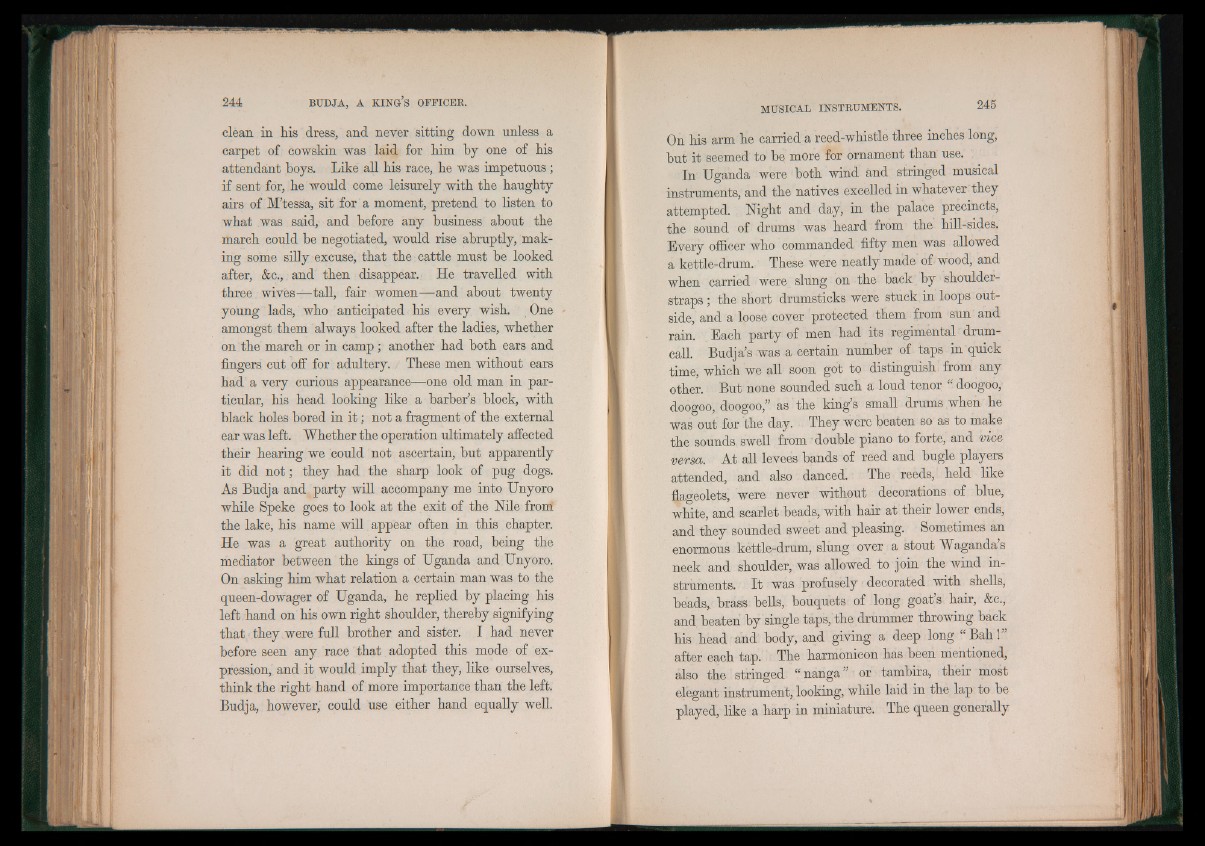
clean in his dress, and never sitting down unless a
carpet of cowskin was laid for him by one of his
attendant hoys. Like all his race, he was impetuous;
if sent for, he would come leisurely with the haughty
airs of M’tessa, sit for a moment, pretend to listen to
what was said, and before any business about the
march could be negotiated, would rise abruptly, making
soine silly excuse, that the $ cattle must be looked
after, &c., and then disappear. He travelled with
three wives—tall, fair women—and about twenty
young lads, who anticipated his every wish. One
amongst them always looked after the ladies, whether
on the march or in camp; another had both ears and
fingers cut off for adultery. These men without ears
had a very curious appearance—one old man in particular,
his head looking like a barber’s block, with
black holes bored in i t ; not a fragment of the external
ear was left. Whether the operation ultimately affected
their hearing we could not ascertain, but apparently
it did not; they had the sharp look of pug dogs.
As Budja and party will accompany me into Unyoro
while Speke goes to look at the exit of the Nile from
the lake, his name will appear often in this chapter.
He was a great authority on the road, being the
mediator between the kings of Uganda and Unyoro.
On asking him what relation a certain man was to the
queen-dowager of Uganda, he replied by placing his
left hand on his own right shoulder, thereby signifying
that they were full brother and sister. I had never
before seen any race that adopted this mode of expression,
and it would imply that they, like ourselves,
think the right hand of more importance than the left.
Budja, however, could use either hand equally well.
On his arm he carried a reed-whistle three inches long,
but it seemed to be more for ornament than use.
In Uganda were both wind and stringed musical
instruments, and the natives excelled in whatever They
attempted. Night and day, in the palace precincts,
the sound of drums was heard from the hill-sides.
Every officer who commanded fifty men was allowed
a kettle-drum. These were neatly made of wood, and
when carried were slung on the back by shoulder-
straps ; the short drumsticks were stuck in loops outside,
and a loose cover protected them from sun and
rain. Each party of men had its regimental drum-
call. Budja’s was a certain number of taps in quick
time, which we all soon got to distinguish , from any
other. But none sounded such a loud tenor “ doogoo,
doogoo, doogoo,” as the king’s small drums when he
was out for the day. They were beaten so as to make
the sounds swell from' double piano to forte, and vice
versa. At all levees bands of reed and bugle players
attended, and also danced. The reeds, held like
flageolets, were never without decorations of blue,
white, and scarlet beads, with hair at their lower ends,
and they sounded sweet and pleasing. Sometimes an
enormous kettle-drum, slung over a stout Waganda’s
neck and shoulder, was allowed to join the wind instruments.
It was profusely decorated with shells,
beads,; brass bells, bouquets of long goats hair, &c.,
and beaten by single taps, the drummer throwing back
his head and body, and giving a deep long “Bah!”
after each tap. The harmonicon has been mentioned,
also the stringed “ nanga ” or tambira, their most
elegant instrument, looking, while laid in the lap to be
played, like a harp in miniature. The queen generally